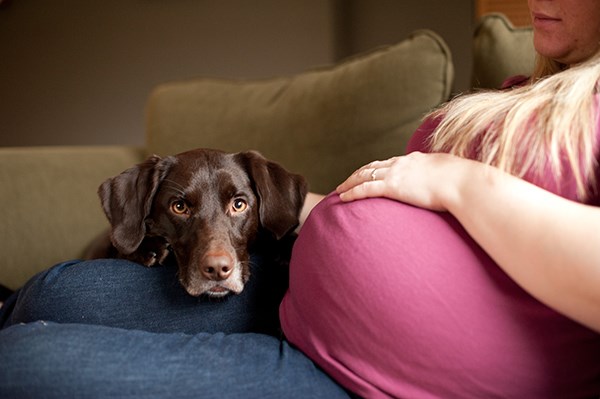Dogs are often a couple’s first “baby,” but once a real baby enters the fray, it is important to have a plan for “fur baby.”
Many people are challenged and stressed at this transition point of life, according to Squamish’s Maren Bruun, a certified professional dog trainer and a licensed presenter for Family Paws Parent Education.
If someone is used to being a pet parent, what will they do when the a baby comes? “People think it won’t change,” Bruun said.
But things do change when baby comes.
The planning should begin during pregnancy, and the first step is to be realistic about what life will be like with a newborn and a pet.
Bruun said many expectant mothers have an unrealistic idea of what they have to be like once baby comes home: “‘I have to be the perfect mom and still walk my dog and still exercise and be fit and go to yoga and look after my baby,’” she said.
Practical things such as hiring an occasional dog walker for the first few months after baby comes home and buying a special treat or toy for the dog for days it is just not possible to get out a long walk can go a long way to alleviating stress on both the humans in the house and the dog.
And just like when owners are sick and the dog adjusts to a day at home on the couch, on the odd day when the dog doesn’t get out for a walk thanks to new baby, it will be OK, said Bruun, herself a mom of two teenage daughters and a pet parent of two dogs, two cats and two birds.
Bruun said being realistic can help parents get through the “impulsive re-homing phase,” a period when many new parents get rid of their dog.
“The first few weeks have gone, your in-laws have stopped coming around and helping, all the gifts and dinners are stopped and then you are a few weeks into baby and, no more help and then husband has gone back to work. That can be a really stressful time where all of a sudden, ‘My dog isn’t getting enough attention, maybe I should get rid of the dog,’” Bruun said.
People worry the dog isn’t getting what it deserves in that time, but often it is just a temporary period and later there is regret.
“There is a time and a place for re-homing a dog, I am not against that for sure, but don’t let it be an impulse decision,” said Bruun, adding that if the dog has quite extreme behaviour challenges, there may be good reason to give that pet to a home without young children.
Factors that impact how to handle the mixing of dog and new baby include the temperament of the dog, the dog’s previous training and the dog’s general manners, Bruun said.
Assessing your dog’s temperament and ability to behave is an important step before baby comes home.
“If you don’t get a handle on attention-seeking behaviours early, then when baby comes you can’t tell a dog, ‘No, not now’ and then you get mad, but they don’t know what else to do,” said Bruun.
It is also not necessary for fur baby and human baby to meet the minute baby comes home.
“You want to have a controlled meeting,” she said, when everything is calm and there aren’t a lot of new stimuli around, such as houseguests, it’s a much better time for everyone to get used to each other.
Bruun said a baby and dog should never be left unattended together, for safety reasons.



